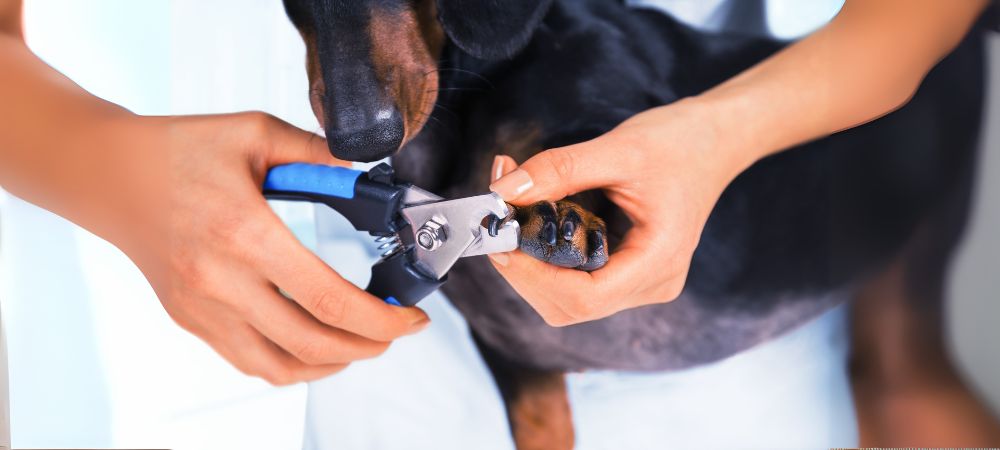How to Trim Dog Nails Safely at Home: Tips & Tricks
30‑Second Summary
Trimming your dog’s nails safely at home is simple with the right tools, routine, and technique. Use sharp clippers or a grinder. Trim slowly, just the tip, stay clear of the quick. For light-colored nails, locate the pink quick; for dark nails, cut tiny bits gradually. Aim to trim every 3–6 weeks, or whenever nails click on hard floors. Use treats and praise. Keep styptic powder or cornstarch ready in case of bleeding. This guide covers tools, steps, puppy training, safety, and FAQs.
1. Why You Should Trim Dog Nails

Long nails aren’t just aesthetic; they cause pain and health issues.
- Can alter gait and posture, leading to joint problems.
- Increase risk of splits, breaks, or ingrown nails.
- Clicking on floors signals overgrowth—time to cut dog nails.
- Don’t be boring, short nails = happy, healthy pup!
2. How Often to Cut Dog Nails
Factors: activity level, walking surface, breed, age, and nail color. General rules:
- Active dogs on concrete: every 4–6 weeks
- Less active or carpet/home dogs: 3–4 weeks
- Click test: If you hear nails when they walk
- For puppies, introduce nail care early, aim weekly or bi‑weekly until the quick recedes.
3. Tools You’ll Need
Choose the right tools based on nail thickness:
- Scissor-style clippers: for small/medium dogs
- Guillotine clippers: easy on small nails
- Pliers-style: for thick nails
- Nail grinder/Dremel: great for smoothing edges, especially for black nails
- Always have styptic powder or cornstarch on hand to stop bleeding.
- Consider using Soluky Pet’s gentle nail clippers or a soothing paw wash afterward for smoother results.
4. Step‑by‑Step: How to Cut Dog Nails
Here’s how to cut dog nails step by step:
- Introduce clippers or a grinder near paws.
- Extend the toe, trimming the tip only.
- For clear nails, stop before you reach the pink quick.
- For dark nails: trim tiny bits until you see a chalky dot.
- Smooth edges with a file or grinder.
- Reward with praise and favorite dog treats throughout. You can reward your dog with a freshly made, human-grade dog treat from Soluky Pet after each successful trim.
- Stop and assess after each nail.
- Reward with praise and favorite dog treats throughout.
- Stop and assess after each nail.
Bucket Brigade: Let’s keep going. Your pup’s comfort comes next!
5. Puppy‑Friendly Nail Care
Start early using gentle desensitization:
- Touch paws during pet time.
- Show clippers, reward calm behavior.
- Trim tip only.
- Always end with praise and a special reward. You can reward with Soluky Pet’s freshly made, single-protein treats to reinforce positive behavior.
This makes trimming dog nails easy as they grow up.
6. Safety Tips When Cutting Dog’s Toenails

- Stay calm, pups sense anxiety.
- Trim in a well-lit, quiet spot.
- Take breaks; it’s fine to limit to a few nails per session.
- Have a helper hold the dog if needed.
- Keep tools clean and sharp.
- If your dog gets anxious, try using Soluky Pet’s calming treats before the trimming session.
7. What to Do If You Cut Dog’s Nail Too Short
Stay calm, panicking stresses your dog.
- Apply styptic powder or cornstarch; hold gently.
- Keep pressure for several minutes.
- Monitor for 2–3 days to prevent infection.
- Call the vet if bleeding continues beyond 10 minutes. Follow up with a calming balm from Soluky Pet to soothe your dog’s paws after the incident.
8. Benefits of a Nail Grinder
- Smooth, rounded nails = less likelihood of snagging.
- Ideal for black nails, no sharp clip lines.
- It may be less stressful than clipping.
- But be cautious: hair can get caught, and dust may irritate—use outside and keep hair clear.
9. Nail Anatomy: Know Before You Clip
Before learning how to trim dog nailssafely, it helps to understand what you’re dealing with. A dog’s nail consists of:
- The hard outer shell: This is the part we see and cut.
- The quick: This is the soft tissue inside the nail that contains nerves and blood vessels.
- The nail bed: This area supports nail growth, just like in humans.
Clipping into the quick causes pain and bleeding. That’s why it’s important to trim gradually and learn how to recognize the quick, especially in dark-colored nails where it’s not visible.
Tip: Shine a flashlight under the nail to better see the quick in semi-transparent nails.
10. How to Clip Dog Toenails That Are Black or Dark
Cutting a dog’s toenails when they’re dark can be nerve-wracking.
But here’s how to do it right:
- Trim tiny slivers at a 45-degree angle.
- Watch for a small gray or pink oval in the center.
- When you see a grayish center with a moist texture, stop! The quick is near.
- Many pet parents prefer using a grinder for dark nails since it gives them more control and avoids harsh snips.
Pro tip: Practice on one nail per day until you feel confident..
11. Positioning Tips: How to Hold Your Dog Safely

The way you hold your dog during nail trims can make or break the experience. Each dog is different; some feel safer sitting in your lap, while others do better standing or lying down.
Try these setups:
- Small Dogs: Place on your lap or a non-slip table. Wrap in a towel “burrito-style” if needed.
- Medium/Large Dogs: Have them lie on their side or sit calmly. Enlist a second person to hold the collar gently.
12. Groomer Hacks You Can Use at Home
Professional groomers use these tried-and-true tips you can apply in your routine:
- Clip After Bath Time: Warm water softens nails, making them easier to cut after a bath. Your dog is most relaxed.
- Use Natural Light: If possible, trim during daylight near a window. Good lighting helps you avoid cutting the quick, especially in dark nails.
- Dull Tools = Danger: Always keep your clippers or grinders sharp and clean. Dull tools crush the nail, causing splintering or pain.
- Set a Routine: Add trimming dog nails to your grooming schedule. Set a reminder every 3–4 weeks. Regular trims = shorter quicks = easier trims.
13. Why Nail Health Matters More Than You Think
Nail care isn’t just about looks. If you skip trimming for too long, the consequences can be serious:
- Infection: Overgrown nails can curl and embed into the paw pad, leading to infection or abscesses.
- Balance issues: Dogs may shift their posture to avoid pain, putting stress on their hips, knees, and spine.
- Behavior changes: Chronic discomfort can cause irritability, reactivity, and even aggression.
A simple how to clip dog’s nails routine every few weeks helps avoid vet bills and behavioral issues.
14. What If You Can’t Do It Yourself?
Let’s be honest, not every dog owner can cut dog nails at home. That’s OK! Here are your options:
- Mobile groomers: They come to your home, which means less stress for both of you.
- Veterinary techs: Many vet clinics offer walk-in nail trims.
- Dog daycares or pet stores: Check if they offer trimming services.
You can even ask them to show you how to clip dog toenails safely, so you can build confidence for next time.
11. FAQs
Q1: How to trim dog nails without the quick?
A: Cut tiny bits. With clear nails, avoid reaching the pink. With dark nails, trim until a chalky ring appears.
Q2: Can I just file instead of cutting dog nails?
A: Yes! A nail grinder or strong file works well, especially if your dog hates clippers.
Q3: My dog resists, what now?
A: Keep sessions short. Use a calm voice, treats, and positive reinforcement. Gradual exposure wins.
Q4: How to care for dewclaws?
A: Dewclaws don’t touch ground; trim more often to prevent overgrowth and snagging.
Q5: Should I trim after a walk?
A: Yes, check nails each week and trim if needed. Use the click test on hard floors.
Call to Action
Learning how to trim dog nails safely at home empowers you to protect your dog’s posture, paws, and comfort. Trim every few weeks, use the right tools, and follow step‑by‑step with gentle rewards. Prepare for mistakes, and don’t hesitate to consult your vet or groomer if needed. Take control of your pup’s paw care today, try one nail, celebrate the win with a human grade dog food treat from Soluky Pet, and go from there!
Now grab those clippers, prep the treats, and give your dog a confident, safe nail trim. You’ve got this!


